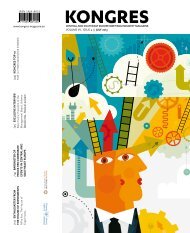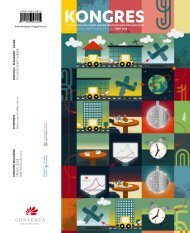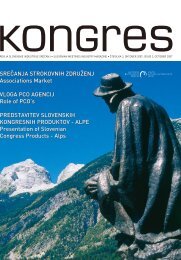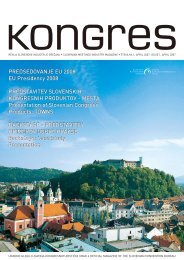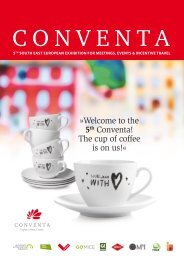EIBTM 2008 Industry Trends & Market Share Report - HCB
EIBTM 2008 Industry Trends & Market Share Report - HCB
EIBTM 2008 Industry Trends & Market Share Report - HCB
You also want an ePaper? Increase the reach of your titles
YUMPU automatically turns print PDFs into web optimized ePapers that Google loves.
There are also encouraging signs this year that the move towards greener meeting is<br />
being driven by the associations segment of the conference market. For example,<br />
when the American Institute of Architects (AIA) committed to greening all 140 of its<br />
meetings, including one of the largest association conventions in the US, it set off a<br />
wave of ‘green’ compliance among all its vendors, venues, and exhibitors, including a<br />
contractor who went on to develop an eco-friendly product that is now the standard<br />
for all its clients. The AIA does not only ask its vendors to make changes: attendees<br />
are also asked to contribute, by, for example, printing materials at home to bring to<br />
the meeting, carpooling or using public transportation, or signing up for a carbonoffset<br />
programme (Association Meetings 01/10/08).<br />
As a consequence of the escalating concern to make events as ‘green’ as possible,<br />
environmental standards are constantly rising. For example, AIME <strong>2008</strong>, the 16th<br />
Asia-Pacific Incentives & Meetings Expo set a new benchmark for exhibitions in<br />
Australia, by qualifying as a Climate Neutral event. AIME Climate Neutral was a<br />
joint initiative of Melbourne Convention and Visitors Bureau, Reed Travel Exhibitions<br />
and Climate Friendly, an Australian organisation committed to providing real<br />
climate change solutions. The initiative was supported by the Melbourne Exhibition<br />
and Convention Centre, the venue for AIME. Based on information and data provided<br />
by RTE, MCVB and MECC on AIME 2007, Climate Friendly assessed and calculated<br />
the carbon footprint of the event. Then, to neutralise these emissions, Climate<br />
Friendly provided AIME with 100%-accredited GreenPower energy from a wind<br />
farm in South Australia and neutralised remaining emissions by purchasing carbon<br />
credits from a Kyoto-compliant wind farm in China. All exhibitors and visitors were<br />
encouraged to neutralise their travel emissions by purchasing carbon credits using<br />
the Climate Friendly calculator on the AIME website, and companies and individuals<br />
who offset their carbon emissions were recognised on the AIME website for their<br />
contribution to AIME’s Climate Neutral status.<br />
However, it is clear that there is much more to CSR than simply ensuring that<br />
meetings and events are as ‘green’ as possible. Concern for the wellbeing and<br />
prosperity of those living and working in the destinations where events take place is<br />
a key performance indicator for CSR in this context. Clients, organisers and suppliers<br />
in the meetings and events industry must be mindful of the impacts of their events<br />
on people and communities.<br />
This represents an opportunity as well as a challenge. Martin Sirk, CEO of ICCA, the<br />
International Congress and Convention Association believes that by articulating and<br />
promoting the social benefits of their events, international associations can improve<br />
the way they are perceived, winning greater support from the destinations which<br />
host their congresses, improving their negotiating position vis-à-vis suppliers, and<br />
energising their various stakeholders. He has stated that the political debate is<br />
shifting from direct economic impact alone to the CSR impact of international<br />
meetings, and this is where international associations can make some powerful<br />
arguments. Politicians like to hear about how international events can create a social<br />
‘legacy’ in their communities, by, for example, accelerating medical advancement for<br />
their local healthcare systems or by boosting the prestige and funding opportunities<br />
for their universities and scientific institutions. The benefits to the community, of<br />
hosting association conferences, could include world-leading surgeons conducting<br />
master classes in local hospitals; business leaders visiting schools to talk about the<br />
skills needed for success in tomorrow’s globalised workplace; or Nobel prize-winners<br />
giving public lectures to complement their scientific congress presentations.<br />
8



